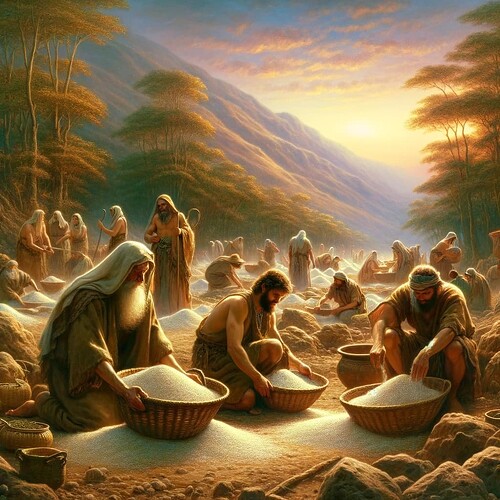![]() February 8: Exodus 16 - Manna from Heaven: God Provides in the Wilderness
February 8: Exodus 16 - Manna from Heaven: God Provides in the Wilderness
 Introduction
Introduction
In Exodus 16, we journey alongside the Israelites as they trek through the wilderness only to fall into despair and question their leader, Moses. But God, unwavering in His promise, showers their path with sustenance from the heaven – the Manna and Quail.
 Struggle in the Wilderness
Struggle in the Wilderness
Just a month after escaping Egypt, the Israelites started to grumble against Moses and Aaron out of hunger. They wished they had died by the Lord’s hand in Egypt, where they sat around pots of meat and ate their fill of bread. Their quick turn to despair paints a picture of human’s fickle faith.
![]() Key Verse:
Key Verse:
Exodus 16:4 - “Then the Lord said to Moses, “I will rain down bread from heaven for you.”
 Manna From Heaven: God Provides
Manna From Heaven: God Provides
God heard their grumbling and sent bread from heaven - manna. In addition to the daily manna, God provided quail as means for meat. In God providing daily bread, He taught them trust and obedience, providing ‘double portions’ ahead of the Sabbath.
 Key Themes and Reflections
Key Themes and Reflections
God as Our Sustainer: One key theme we see played out in Exodus 16 is God’s role as our sustainer. Despite their complaints, God provided for the Israelites daily. This teaches us about God’s faithful provision, even in the wilderness seasons of our lives - quite a crucial refreshment for our modern, often demanding lives.
 Today’s Application
Today’s Application
Look for manna in your life today - the gifts God provides - not only material, but also spiritual and emotional, like peace, joy and guidance. Learn to trust in God’s daily provision.
 Hidden Gem
Hidden Gem
‘Manna’ means “what is it?” The Israelites weren’t sure what they were being fed, yet they accepted it. This mirrors how we often encounter unfamiliar God-provided blessings and should graciously acknowledge and accept them.
 Reflective Q&A
Reflective Q&A
![]() Why did God choose Manna and Quail to feed the Israelites?
Why did God choose Manna and Quail to feed the Israelites?
A: God was teaching the Israelites about His providence and sufficiency. He provided what was needed, when it was needed.
![]() What can we learn about gratitude from Exodus 16?
What can we learn about gratitude from Exodus 16?
A: Despite their complaints, when God provided, the Israelites recognized it as a blessing. We too should always recognize and thank God for His daily blessings.
![]() Join the Discussion:
Join the Discussion:
Reflect on the times that God has provided for your needs. Share your testimonies with us and encourage others in their walk of faith.
![]() See You Tomorrow in Exodus 17, 18
See You Tomorrow in Exodus 17, 18
We’ll dive into the first mention of Amalek, who’ll play a recurring role in Israelite history and how Moses shows the power of intercessory prayer. Stick around!
Carry the memory of the manna God brings into your life daily and keep on trusting His provision!
